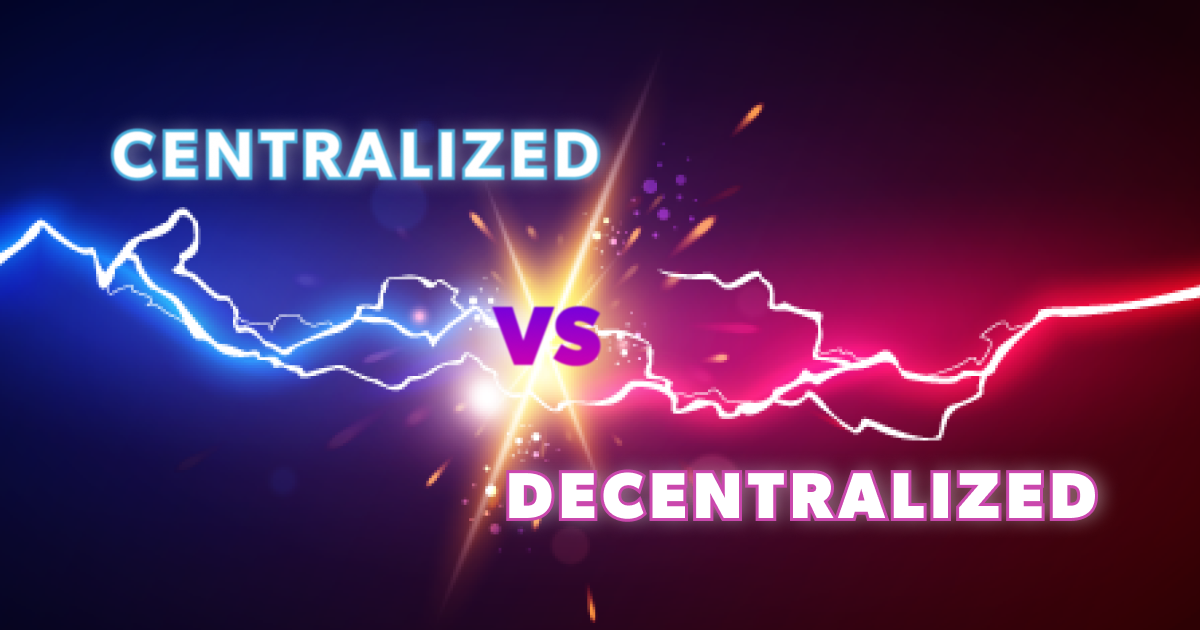Decentralized technologies really aren’t anything new. Yet, there is a war brewing between centralized and decentralized systems. We seem to take one step forward, and then two steps back. Just take a look at the most famous example of a technology that is supposed to be decentralized – the Internet! You have to ask yourself… is it really decentralized if a few tech giants control almost everything we do? Hardly so.
The concept of decentralization didn’t really become popular until the advent of blockchain-based cryptocurrencies. What is it about decentralized solutions that sprung them into global consciousness? Well, I think most people are over the alternative. We want autonomy and we want it now!
So, let’s take a step back and look at how blockchain decentralization works.
Using cryptography to secure monetary transactions was never an unconventional idea. The real reason why people immediately considered blockchain a revolutionary technology was due to something else – full and complete decentralization.

Bitcoin was not the first attempt at creating something resembling “digital cash”. Online payment processors already operated in an established market when Bitcoin was created. So, why did the world deem Bitcoin as something so groundbreaking?
Well, with Bitcoin, there was suddenly an option that didn’t involve any intermediaries or “trusted” third parties. Note the quotations around trusted. Are these centralized intermediaries really to be completely trusted? More on this another time… the short answer is no.
Cryptocurrencies do not use centralized servers located in giant server rooms of some multinational corporation. Instead, transactions are processed by thousands of fully independent nodes located in almost every country in the world. Networks are truly inclusive and democratic. We like this.
When it comes to fiat, politicians, and central bankers can always create more currency out of thin air whenever they feel like it. This results in inflation and the devaluation of money. It’s ridiculously unstable and makes zero sense.
Now, let’s talk about something that does: DeFi. It’s the next step in the evolution of finance.
Let’s get educated on this! The concept of DeFi is quite self-explanatory. It pretty much means taking any type of traditional financial concepts (such as banking, loan, interest, or insurance) and using blockchain technology to provide the same basic functionality in a decentralized manner.
The potential applications of DeFi are virtually endless… limited only by the imagination of blockchain developers. So far, the most popular applications of DeFi have been DEXs: decentralized exchanges.
DEXs empower people to buy and sell numerous cryptocurrency coins and tokens in a permissionless, peer-to-peer way. There’s no need to go through a lengthy and convoluted process to gain access to DeFi protocols. Users can simply start trading right after connecting their wallets to the exchange. It couldn’t be any easier!
Another massively popular application of DeFi is earning blockchain-based passive income. Solutions such as yield farming and flash loans enable people to earn interest in the same way that was traditionally reserved only to banks. The difference? The interest rates are actually worth it for once.

The War Between Decentralized vs. Centralized
There is definitely some pushback from governments and power players who are not big fans of DeFi. Some are fearful that potential bad actors could use DeFi as a weapon for illegal activities. Nonetheless, most are actually worried about losing their power. The power they have over the people. Decentralization, on the other hand, gives this power back.
Some think DeFi could lead to a wider disregard of regulations, especially Know Your Customer/Anti-Money Laundering procedures. There are also some persistent security issues with DeFi… hackers, cheating, and fund withdrawals from smart contracts.
There are good reasons why many centralized authorities around the world are concerned with the growing popularity of decentralized solutions. However, everything they say needs to be taken in with some skepticism. They are not motivated to have DeFi succeed, but they are very motivated to have it vanish.
But the fact remains that the benefits of decentralization are numerous and outweigh the cons.
The most important ones include:
- Freedom
You don’t have to ask anyone for permission to do anything. All decentralized networks allow anyone, anywhere in the world, to participate in them, and to freely enjoy their benefits. Thanks to decentralization, people are no longer forced to depend on sleazy politicians and bankers. They are now empowered to take their finances into their own hands.
2. Security
All decentralized solutions are by default founded on blockchain and smart contracts. This means that all operations on decentralized networks are secured by state-of-the-art, military-grade cryptographic algorithms. How much more secure can it get? The level of security which results from decentralization is unparalleled. Money stored on the blockchain is theoretically much more secure than money stored even in the safest bank. Seems to contradict their worry about hackers, right?
3. Efficiency
Decentralized solutions are not only more empowering and more secure than their centralized counterparts – but they are also more efficient. Centralization always involves high maintenance costs, as everything from servers and electricity to the executives’ salaries has to be paid from the fees paid by the users. Decentralization massively decreases all costs involved, which means that the fees paid by the users of decentralized platforms are usually very small.
As the name DeFi suggests, the Decentralized Finance ecosystem is also dominated by decentralized solutions. However, some of the largest players in the cryptocurrency market are now blending the centralized and decentralized model.
Well-managed exchanges can be instrumental in bringing new DeFi users onboard because they give you all the benefits of decentralized protocols in a safe setting. This is exactly what NetCents plans to do. With this, users can feel confident about the choices they’re making.
Unlike big banks, we’re not about restricting the masses, we’re about empowering them! I think in the coming years, banks are going to need to adapt or get left behind. People aren’t stupid. Once DeFi protocols really start attracting mainstream attention, I think banks don’t stand a chance. In fact, we are already starting to see the decay of the traditional bank. They’ve put off adopting for too long, and now they’re getting leap frogged as virtual banks, exchanges, DeFi, and crypto becomes the norm. People are smart enough to take care of their own finances, and we see that.
In our next post, titled “The Voices That Matter – How to Navigate Opinions in the Crypto World,” we will dive into how to navigate the many, and vastly different, perspectives in this space. We will also explain why some leaders in the traditional financial world are not the best resources to advise people about crypto. And that’s an understatement.
Want to be the first one to see my new posts? Make sure you’re following me on Linkedin, Twitter, and Instagram.
